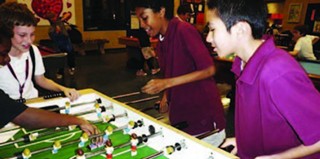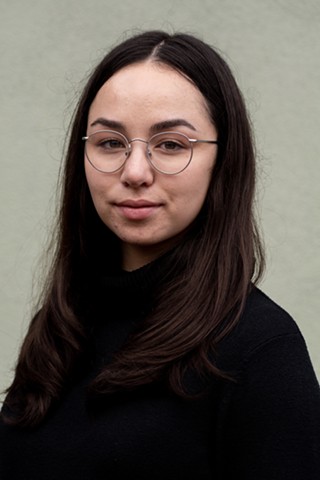Marana resident Lorna Conlisk never allowed her five children to have electronics in their bedrooms, but the COVID-19 outbreak changed that.
A mother of five in the Marana Unified School District, Conlisk has four children in grades 5, 6 and 8 that attend Dove Mountain K-8 School. Her eldest child is a senior at Mountain View High School.
When COVID-19 arrived in March and schools closed abruptly, Conlisk had her children working from their dining room table. But now that students have mandatory Zoom meetings throughout the day, all five children couldn't remain in the same space.
"So we had to have the kids work in their room, which is so crazy because we have been so anti-electronics in your bedroom, from the time that they were born," Conlisk said.
The task of constantly monitoring five students' electronics gets exhausting, Conlisk said. So now, her children only use their school computers if they have an active project and she disconnects the WiFi when they're finished. Conlisk currently isn't working but has a career in federal government, most recently the U.S. Marshals Service. She said this unique time when she isn't working is a great help, because all she can do during the day is help with her children's schoolwork.
"I don't get anything else done; there's no food prep, there's no house cleaning like I've done before—I don't have time to do anything," Conlisk said. "I've had to be so much more involved in their education than I've ever been."
Thousands of other families across Pima County are in similar situations. While local school districts are required to provide learning centers for students in certain circumstances, capacity is limited and many working families are struggling at home to be full-time employees and full-time child monitors.
Recognizing this dilemma, several community organizations have pivoted their resources to provide a daily student supervision service to families who need it.
The Tucson Jewish Community Center has operated an after-school care program for a long time, and recently transitioned that program into "J-Care Plus," where staff members help students throughout their online school day.
"We wanted to be able to support the parents who are trying to figure out how to make these tough decisions, and who are being put in kind of a pickle about 'How do I do my work and also make sure my child is on track in school and doing what they need to be?'" said JCC Communications Director Khylie Gardner.
In J-Care Plus, staff members help students log onto their classes and make sure they are engaged in their daily tasks. Outside of that, Gardner said they are supplementing online learning with enrichment activities using the JCC's tennis and basketball courts, swimming pool, art studio and other amenities.
J-Care Plus is a Monday through Friday program for students in grades K through 6. Drop-off is at 8 a.m. and pick-up is available as late as 6 p.m. Families can also request an earlier drop-off time if their child starts online classes earlier than 8 a.m. Morning and afternoon snacks will be provided and the JCC has established extensive sanitary protocols for the program.
According to Gardner, all students and staff members will be required to wear masks and students will be in groups of no more than 10. Parents and guardians are limited to curbside pick-up and drop-off so no other adults enter the building. Upon drop-off, everyone who is in the car with the child receives a wellness screening and a temperature check. Then, provided that no one in the car is exhibiting any symptoms of COVID-19, the child is allowed inside the facility.
When parents are ready to pick up their children, the JCC has developed a smartphone app that they will use to obtain a special identification number. This will be used to alert staff inside that a child's parents have arrived at the curb and a staff member will walk the child out to their car.
Gardner said as long as there are chools in town that are doing virtual instruction, the JCC will continue to offer J-Care Plus as a service to parents.
"We just really wanted to give people an outlet and we felt like we were kind of uniquely positioned to do it because we have done after-school care in the past, so lots of families and schools know us and know that we're safe and we ran summer camps so successfully this summer," Gardner said.
J-Care Plus costs $325 per child for two weeks. There is a 5 percent siblings discount for families with multiple children. Last week there were about 60 students enrolled in the program and the JCC has capacity for about 100 more. Interested families can sign up for the program at tucsonjcc.org/j-care-plus or call the membership line at (520) 299-3000.
The City of Tucson's KIDCO
after-school and summer program has also adapted into an all-day care program for students engaged in remote learning. Staff help supervise children and troubleshoot IT issues, and provide outdoor recreational programming after the school day is over.
According to Dawnee Moreno, Recreation Manager with Tucson Parks & Rec reation, the program has a 10-to-1 student/staff member ratio and each student is provided with their own materials to prevent the spread of germs. All students and staff in the program are required to wear masks indoors and outdoors when they cannot maintain six feet of physical distance.
The children will be encouraged to participate in regular sanitary protocols such as handwashing, and all materials and surfaces used will be cleaned on a daily basis. KIDCO also initiated contact-less pick-up and drop-off using cell phones and perform wellness checks for all students arriving for the program.
Students will stay in the same group each day they participate in the program to prevent the mixing of people across groups. KIDCO has a network of sites where their programs take place and only 20 children are allowed at each site.
Moreno said that one-adult working families, two-adult working families and families with older adults such as grandparents all have a need for this kind of service. KIDCO has more than 100 students enrolled and they expect more interest in the coming weeks. As of last week, KIDCO has capacity for up to 240 students.
"We all realize that there's definitely a need for members of our community, whether it be the single parent who is working as an essential worker, or two parents in the household that are working and don't have any family or they only have that elderly parent who's an at-risk population and it's always risky to have that kind of interaction every day," Moreno said.
Moreno said they are often asked why they are opening their services to students while it is unsafe for schools to be open. She explains they are running a program of 20 children, not a school filled with hundreds of students.
"We're trying to keep everybody safe, not just the kids, but the school staff that are on site and our own staff," she said. "So we recognize the need, but we also created these new policies and new procedures and new guidelines to keep everybody as safe as possible."
Their hours are now 7:30 a.m. to 6:30 p.m. The KIDCO program costs $125 per child per month. Families that live within city limits can apply for a 50 percent discount program based on household income. To learn more information about KIDCO and apply, visit ezeereg.com or call (520) 791-4877.
The Tucson Boys & Girls Club operated a summer camp program and has transformed it into something that will provide for students during the regular school year. They are keeping their small staff-to-student ratios and are implementing new face mask requirements, wellness checks, temperature screenings, sanitary practices and more.
According to Marketing and Communications Director Melissa Royer, all Boys & Girls Club staff has been trained to help students navigate their technology. The students need to bring their own computers, but the Boys & Girls Club also has some computers available to those who don't have one.
"After they finish their school day, then we'll go into some of our programming areas," Royer said. "That can include things like Money Matters, we have a cooking club, we have STEM activities and, of course, the one thing all the kids are really needing is some exercise so we have access to the gyms and the basketball court to play some different games while maintaining social distance and wearing your mask. So everything is modified but we're trying to give them the best experience they can have under the circumstances."
The Boys & Girls Club will operate this program as long as the community has a need for it, Royer said. All students in age groups 7 to 17 can participate. While most of these supervision programs are geared toward younger students, the Boys & Girls Club is including teenagers as well. Royer said they were already serving high-school-aged children before the pandemic, so including them in this program is a natural segue.
The Boys & Girls Club opened all six locations for this service on Aug. 3. They are open from 8:30 a.m. to 5:30 p.m. The program costs $50 per month per child, and scholarships are available. Royer said the interest in their program has picked up over the last couple of weeks and they expect to be partnering with school districts to provide services in the near future as well.
"We work with children every single day, and we know that it's not always in the best interest of children to be sitting at home alone, or being home in the environment that may not be safe," Royer said.
To apply and find more information, visit bgctucson.org/clubhouses/membership-info.
The YMCA of Southern Arizona has a remote learning program called Y Kids Choice available at five different locations. Students can come with their laptops and staff members are trained to help them set up and stay flexible with differing school schedules.
After online computer learning has finished for the day, the Y Kids Choice program allows students in small groups to pick which extracurricular activity they want to engage in for that afternoon.
Face masks are required for all staff and students indoors and outdoors when physical distancing is not possible. All children are instructed to follow sanitary practices such as handwashing. For all activities, students have their own materials to prevent sharing between groups and all materials are sanitized daily.
Y Kids Choice is available for all children ages five to 12 years old. Like other programs, the YMCA plans to provide Y Kids Choice as long as schools are operating remotely in the community. As of last week, there are 193 students enrolled and they have capacity for about 20 to 25 spots per day that are available.
Y Kids Choice costs $35 per child per day, with a subsidized rate of $25 per day and other scholarships available. Families sign up for flexible two-week blocks where they can pay only for the days their child actually comes to the facility. To apply, visit tucsonymca.org/program/ykids or call (520) 623-9481.
While there are childcare options available throughout the region, Conlisk said she is more interested in sending her children back to school once in-person classes are permitted.
"I think that there's a lot of responsibility on the parents to make sure the kids are attending the Zoom meetings and stuff that they have to attend," Conlisk said. "It's throughout the whole day. So I have to watch the clock all day and remember which kid has what at what time, and the kids are well intentioned, they're really trying, but they're kids, and they get distracted."











